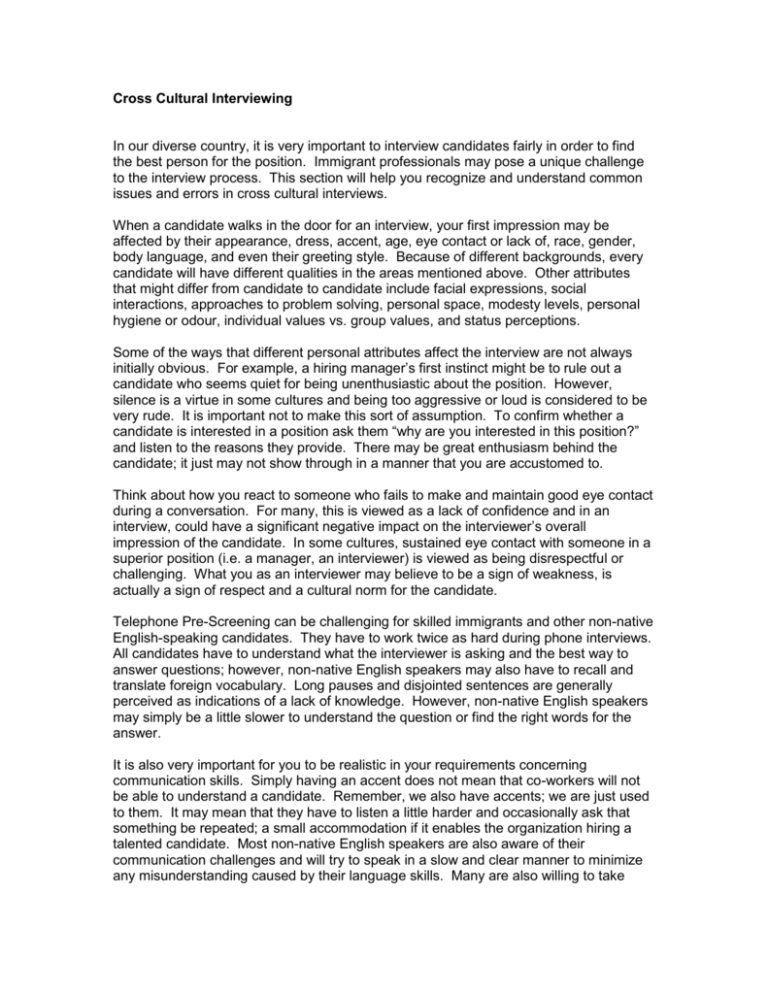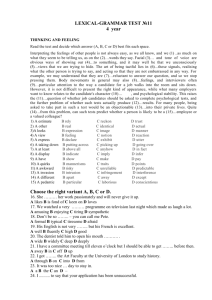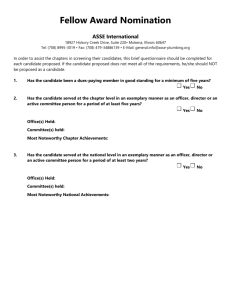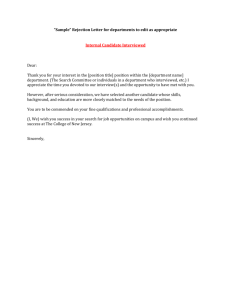Cross Cultural Interviewing
advertisement

Cross Cultural Interviewing In our diverse country, it is very important to interview candidates fairly in order to find the best person for the position. Immigrant professionals may pose a unique challenge to the interview process. This section will help you recognize and understand common issues and errors in cross cultural interviews. When a candidate walks in the door for an interview, your first impression may be affected by their appearance, dress, accent, age, eye contact or lack of, race, gender, body language, and even their greeting style. Because of different backgrounds, every candidate will have different qualities in the areas mentioned above. Other attributes that might differ from candidate to candidate include facial expressions, social interactions, approaches to problem solving, personal space, modesty levels, personal hygiene or odour, individual values vs. group values, and status perceptions. Some of the ways that different personal attributes affect the interview are not always initially obvious. For example, a hiring manager’s first instinct might be to rule out a candidate who seems quiet for being unenthusiastic about the position. However, silence is a virtue in some cultures and being too aggressive or loud is considered to be very rude. It is important not to make this sort of assumption. To confirm whether a candidate is interested in a position ask them “why are you interested in this position?” and listen to the reasons they provide. There may be great enthusiasm behind the candidate; it just may not show through in a manner that you are accustomed to. Think about how you react to someone who fails to make and maintain good eye contact during a conversation. For many, this is viewed as a lack of confidence and in an interview, could have a significant negative impact on the interviewer’s overall impression of the candidate. In some cultures, sustained eye contact with someone in a superior position (i.e. a manager, an interviewer) is viewed as being disrespectful or challenging. What you as an interviewer may believe to be a sign of weakness, is actually a sign of respect and a cultural norm for the candidate. Telephone Pre-Screening can be challenging for skilled immigrants and other non-native English-speaking candidates. They have to work twice as hard during phone interviews. All candidates have to understand what the interviewer is asking and the best way to answer questions; however, non-native English speakers may also have to recall and translate foreign vocabulary. Long pauses and disjointed sentences are generally perceived as indications of a lack of knowledge. However, non-native English speakers may simply be a little slower to understand the question or find the right words for the answer. It is also very important for you to be realistic in your requirements concerning communication skills. Simply having an accent does not mean that co-workers will not be able to understand a candidate. Remember, we also have accents; we are just used to them. It may mean that they have to listen a little harder and occasionally ask that something be repeated; a small accommodation if it enables the organization hiring a talented candidate. Most non-native English speakers are also aware of their communication challenges and will try to speak in a slow and clear manner to minimize any misunderstanding caused by their language skills. Many are also willing to take English as a Second Language (ESL) courses or specific Business English programs to enhance their skills. Things to Think About Be aware of and pay attention to your perceptions of the applicant Try to validate perceptions that are not based on the words said by the candidate Consider past successes and experiences instead of personal traits Speak in a clear, organized manner o Set the stage: Introduce each topic that you are going to discuss. This enables the interviewee to use context to figure out what you are trying to say o Sequence the Questions: Ask one question at a time and avoid jumping around o Get to the point: Avoid rambling by asking specific, concise questions o Own your accent: Simplify your language and use the most standard pronunciation that you can. The candidate may not be prepared for your accent o Reduce barriers: Avoid interruptions and distractions o Avoid jargon/slang: Even an applicant with excellent English grammar and pronunciation, may not know local expressions Listen actively and patiently o Ask for clarification when you don't understand a word or phrase Example: "Excuse me, are you saying you liked or didn't like coordinating the team?" o Validate what you heard if a response sounds unusual or surprising. Example: "Did you say, "flipped out?" or "I'm sorry, I didn't understand what you just said." o Listen past errors: Sometimes phrases don't translate or words get confused o Monitor yourself: Make sure you are not tuning out and thinking about the next question Be aware of possible differences in cultural norms Validate your perception of the candidate’s body language Recognize the relationship between culture and behaviour








